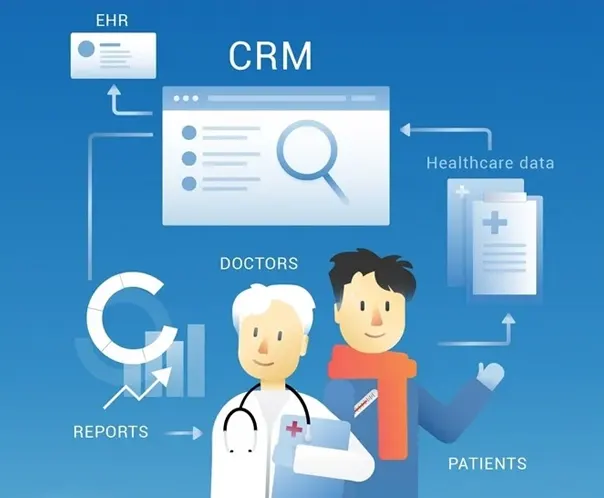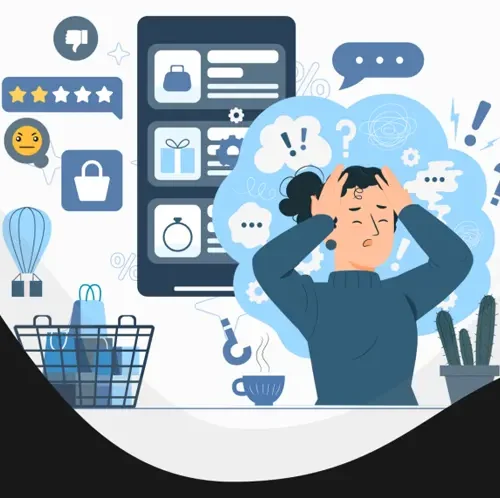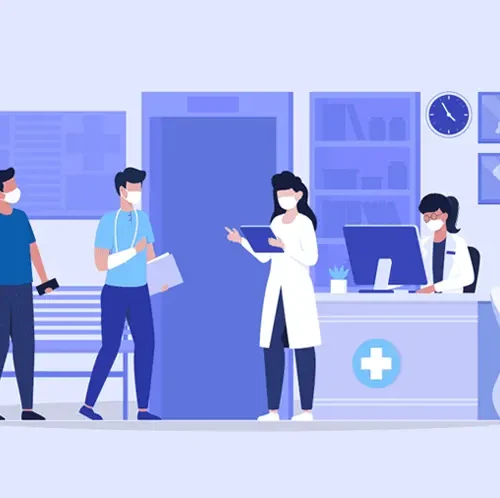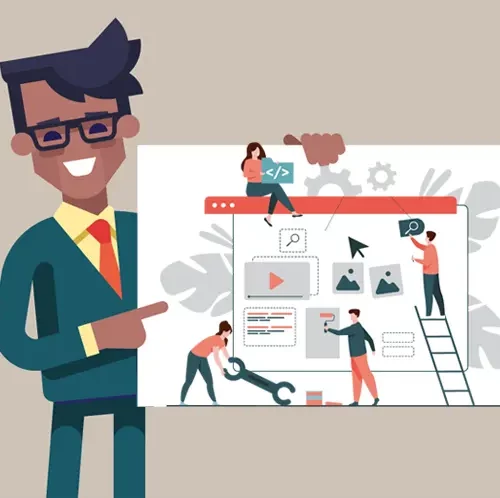As someone in the healthcare ORS Patient Portal, you understand the challenges of engaging, acquiring, and retaining patients. It’s not a simple task, but with the help of CRM software for healthcare, it becomes a lot more manageable.
From optimizing administrative tasks to improving medical and patient care, healthcare CRM has got you covered. And with the expertise of a healthcare software development company like Maven Technology, you can excel at it.
So, what exactly is a healthcare CRM platform?
Well, CRM, which stands for customer relationship management, aims to enhance the relationships between medical organizations and their patients. This, in turn, leads to higher levels of patient satisfaction and more effective care delivery. Custom healthcare CRM development is in high demand, and it’s easy to see why.
By 2030, the healthcare CRM market is projected to reach an impressive USD 31.5 Billion. Healthcare organizations are increasingly adopting CRM due to the growing focus on patient-centric care.y healthcare organizations.
By implementing healthcare CRM software, medical professionals can benefit in multiple ways. Firstly, it promotes medical services and sales, including referrals, lab services, and pharmaceuticals. This helps reach a broader audience and attract more patients to their clinics.
Additionally, healthcare CRM can streamline the delivery of medical services, improve appointment management, and optimize doctors’ schedules. By having critical patient information readily available, doctors can engage patients more effectively and enhance overall satisfaction.
However, CRM is not the only software that can benefit healthcare businesses. One such example is healthcare insurance software, which enables seamless integration with medical services. By leveraging both CRM and insurance software, healthcare providers can maximize their operational efficiency and deliver top-notch patient care.
As a top-rated health tech developer, Maven Technology specializes in medical software development and implementation. With the right healthcare software development company by your side, you can harness the benefits of CRM and stay ahead in a rapidly changing healthcare landscape. Our strong expertise can help healthcare organizations leverage CRM to its fullest potential.
Let’s get into details;
Exploring the Different Types of Healthcare CRM Software!
Now that you have figured out the potential benefits of healthcare CRM software, it’s important to dive deeper into the various types of CRM systems available in the industry.
Each type serves a specific purpose and can help healthcare organizations achieve their goals. Let’s take a closer look at the three main types of healthcare CRM software.
1. Analytical CRM
Analytical CRM software is designed to gather and store valuable customer data for future use. It allows medical organizations to communicate with patients in a more targeted manner. When patients feel that they are being treated differently and receive personalized attention, they are more likely to react positively and remain loyal to the healthcare provider.
Analytical CRM promotes patient retention and helps build enduring relationships between patients and healthcare organizations. To ensure that you make the most of analytical CRM, you can seek CRM expert advice from a consulting firm to build your CRM system.
2. Collaborative CRM!
Collaborative CRM focuses on effective teamwork within a healthcare organization. This type of software is especially useful for large organizations that have multiple divisions managing various operations.
Collaborative CRM allows healthcare institutions to effectively address and streamline communication channels across their client base. This includes phone conversations, texting, emails, newsletters, social announcements, and other forms of communication.
By analyzing the data collected from these communication channels, healthcare organizations gain a deeper understanding of their customers’ characteristics.
The information mentioned is vital for creating personalized communication strategies that cater to the preferences of individual consumers. Collaborative CRM facilitates effective communication, helping to build strong relationships with patients and improve customer retention. Healthcare IT services can greatly assist in the implementation and utilization of collaborative CRM software.
3. Operational CRM
Operational CRM is all about enhancing the operations of a healthcare organization. This type of CRM software automates and streamlines marketing, lead generation, conversion, pre-sales tasks, and workflow.
By automating repetitive tasks, operational CRM allows staff to focus their energies on their core competencies. This saves time and effort and enables teams to utilize their available resources more effectively.
Operational CRM software helps healthcare organizations maximize their productivity by enhancing mission-critical tasks that attract and retain customers.
By choosing the right type of healthcare CRM software for your organization, you can optimize your operations, improve patient engagement and satisfaction, and achieve your business goals.
These classified healthcare CRM software serve a specific purpose and offer distinct benefits. Depending on your organization’s needs, you can select the most suitable CRM software or seek guidance from healthcare CRM experts to ensure successful implementation and utilization.
Why do healthcare systems need Custom CRM software?
Every healthcare organization has to deal with a complex set of challenges and requirements to manage their operations smoothly and provide quality care to their patients. One such challenge is managing patient interactions, which can be a significant burden on healthcare staff.
This is where custom CRM software can be of tremendous help by streamlining communication, simplifying administrative tasks, and enhancing patient experience.
Let’s look at some key reasons why healthcare facilities need CRM software.
Effective PRM (Patient Relationship Management) tool:
One of the most critical aspects of healthcare is building a strong patient-provider relationship. CRM software maintains comprehensive patient profiles, including medical data records, preferences, and past interactions, allowing healthcare facilities to offer more personalized care and build lasting relationships.
➤ Simplified Communication:
Handling patient communication, such as appointment reminders, follow-up messages, and health tips can be time-consuming for healthcare staff. A custom CRM software management can automate and organize communication, ensuring consistent messaging and decreasing the workload of healthcare staff.
➤ Boost Efficiency Operationally:
Administrative tasks like appointment scheduling, patient diagnoses & treatments, and data recording, a significant amount of healthcare staff’s time. A CRM system automates these administrative tasks, freeing up healthcare staff time to focus on their core competency – patient care – improving efficiency and productivity.
➤ Make Able Data-Concise & Informed Decision:
Valuable insights into patient actions, choices, and needs are obtained through data analysis in custom CRM systems. By utilizing this information, healthcare facilities can make well-informed judgments regarding services, treatments, and business strategies, ultimately improving outcomes for patients and the business.
➤ Promotional Outreach Programme Optimization:
CRM tools can assist in targeted marketing efforts, reaching potential patients more effectively and keeping existing patients engaged with relevant health information and services. Such engagement can further reinforce patient-healthcare provider relationships.
➤ Match Regulatory Compliance and Security:
Healthcare data must comply with stringent regulations and mandates under laws like HIPAA, HITECH, GDPR, and COPPA. CRM software systems ensure that data is handled securely and confidentially, with stringent security protocols in place. This is especially important given the risk of data breaches, which are becoming more frequent and severe.
CRM software development has offered multi-fetched facilities, as it enables healthcare industries to facilitate their inside/outside communication, automate managerial tasks, and improve the patient experience.
Implementing CRM software can indeed help increase sales for your healthcare clinic.
Here are a few ways CRM software can achieve this:
1. Increased Lead Generation and Conversion:
CRM software can capture and track leads from various sources, such as website inquiries or referrals. It enables your team to efficiently follow up with leads, improving the chances of converting them into customers and increasing sales opportunities.
2. Personalized Communication and Targeted Marketing:
CRM software allows you to segment your patient database based on various criteria, such as demographics or medical conditions. With this information, you can create personalized marketing campaigns and deliver targeted messages to specific patient groups, resulting in more effective outreach and increased sales.
3. Improved Customer Engagement and Retention:
CRM software helps you keep track of patient interactions and preferences. By understanding your patients better, you can engage with them in a more personalized manner, strengthening relationships and increasing customer loyalty. Satisfied and loyal patients are more likely to continue utilizing your services, resulting in recurring revenue and increased sales.
4. Efficient Appointment Scheduling and Management:
CRM software can automate appointment scheduling and reminders, minimizing no-shows and optimizing your clinic’s capacity. By effectively managing appointments, you can increase patient flow and revenue generation.
5. Upselling and Cross-selling Opportunities:
CRM software can help identify opportunities to upsell or cross-sell services or treatments to existing patients. By analyzing their previous interactions and medical history, you can offer relevant additional services, providing added value to patients while increasing revenue for your clinic.
It’s important to note that CRM software is not a magic solution that guarantees immediate sales growth. Its effectiveness depends on factors such as your implementation strategy, usage by your team, and the quality of the data inputted into the system. However, when utilized effectively, CRM software can be a powerful tool to enhance sales and drive business growth in your healthcare clinic.
How is Maven Technology able to build CRM software for my healthcare clinic? Maven Technology offers custom Healthcare CRM Software Development and CRM Software Development.
Our Custom CRM Software Development enables your healthcare organization by streamlining communication, automating administrative tasks, and enhancing the patient experience at an optimum level.
Investing in a CRM solution can have a significant impact on healthcare organization efficiency, operational costs, and outcomes. It also helps meet regulatory compliance standards and ensures patient data is kept secure and confidential.




